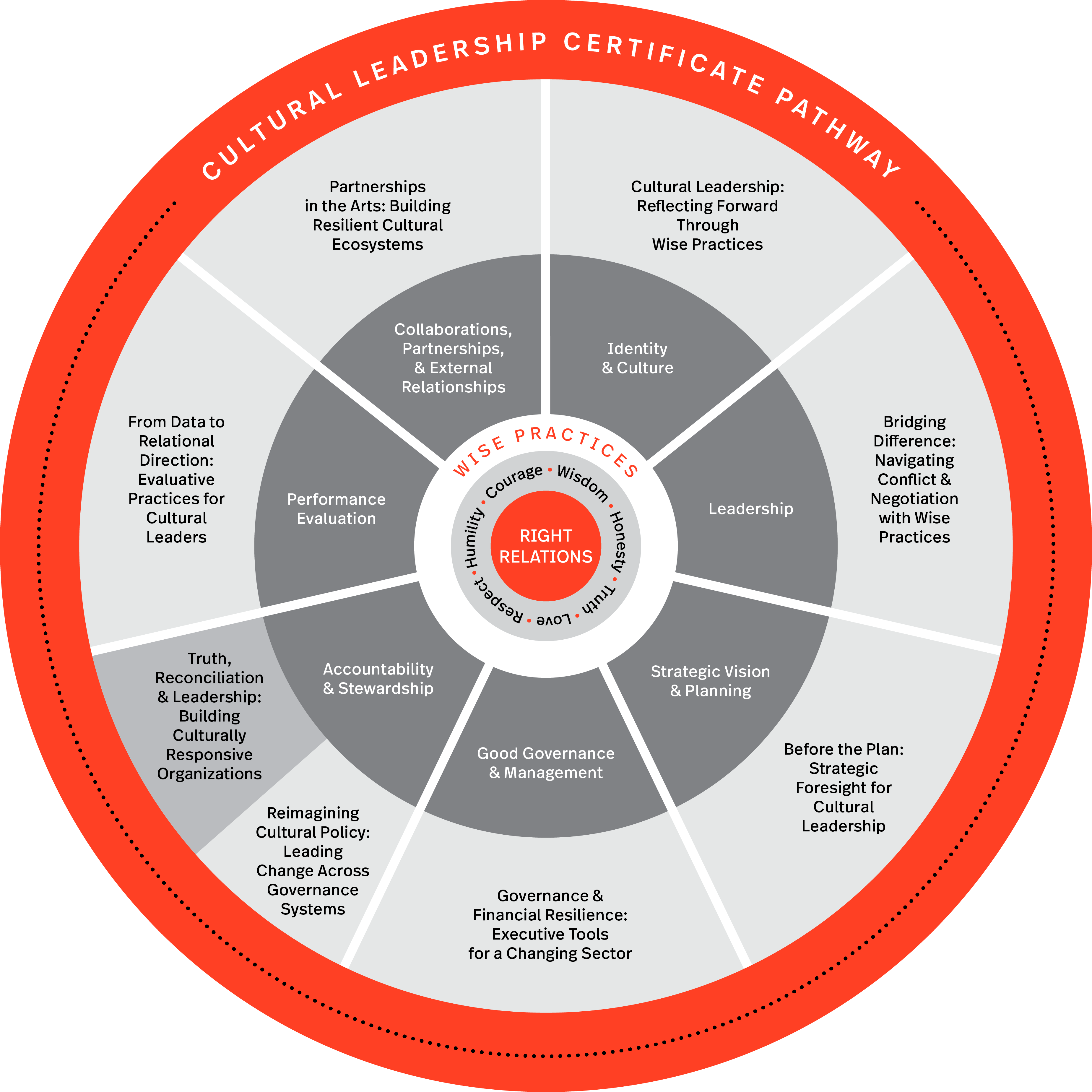What are the Wise Practices Elements for Success?
Ground your leadership in the Seven Wise Practices and Right Relations—centering values like respect, reciprocity, and community, drawn from over 50 years of Indigenous Leadership programming at Banff Centre.
Earn the Banff Centre Certificate of Distinction in Cultural Leadership by completing one program from each wise practice element.

Identity and Culture
Arts and Culture leadership begins with reflection—on personal history, cultural identity, and the relationships that shape one’s connection to land and community. Through wise practices, deep listening, right relations, and self-inquiry, leaders cultivate awareness of the values and contexts that inform their work. This reflective grounding supports culturally rooted leadership that is responsive, relational, and resilient
Program:
- Cultural Leadership: Reflecting Forward Through Wise Practices
Leadership
Leadership in the arts demands the ability to navigate complexity with clarity and courage. In environments shaped by diverse perspectives and competing priorities, leaders must engage in difficult conversations, negotiate with integrity, and address tensions with emotional intelligence. By fostering trust and psychological safety, they transform conflict into dialogue and lead with empathy, decisiveness, and purpose.
Program:
- Bridging Difference: Navigating Conflict and Negotiation with Wise Practices
Strategic Vision and Planning
In a time when society struggles to imagine a possibility-rich future, cultural organizations have a unique role to play as vision holders and change agents. Strategic leadership in the arts requires more than planning—it calls for foresight, systems awareness, and the courage to shape what comes next. By aligning long-term strategies with core commitments and guiding principles, arts leaders can design adaptive pathways forward, anticipate emerging cultural shifts, and offer the kind of imaginative leadership our world urgently needs.
Program:
- Before the Plan: Strategic Foresight for Cultural Leadership
Good Governance and Management
Strong governance and financial systems are essential for arts organizations to thrive in a rapidly changing cultural sector. When rooted in shared values and purpose, these structures foster transparency, continuity, and trust—empowering leaders to navigate complexity with clarity and humility, and to build healthy, entrepreneurial organizations that are responsive to both community needs and sector-wide transformation.
Program:
- Governance and Financial Resilience: Executive Tools for a Changing Sector
Accountability and Stewardship
Arts and Culture leaders hold significant influence and responsibility. Their accountability extends beyond financial stewardship and transparent decision-making to include responding to the Truth and Reconciliation Commission’s Calls to Action and reimagining cultural policy in Canada. By leading with integrity and earning public trust, they help shape a cultural landscape that is dynamic, responsive, and rooted in meaningful change.
Program:
- Truth, Reconciliation & Leadership: Building Culturally Responsive Organizations
- Reimagining Cultural Policy: Shaping Change Across Governance Systems
Performance Evaluation
Evaluation in arts and culture is not just about measuring outcomes—it’s an opportunity to reflect, learn, and transform. When grounded in community values and co-designed with those most impacted, data and research become powerful tools for accountability, storytelling, and change. Thoughtful evaluation practices can deepen relationships, support strategic decision-making, and help build a more generative cultural sector.
Program:
- From Data to Direction: Evaluative Practices for Cultural Leaders
Collaborations, Partnerships, and External Relationships
Arts and Culture organizations have the potential to lead bold, innovative, sectoral, or cross-sector partnerships that go beyond resource sharing to drive lasting cultural impact. Transformational partnerships—grounded in trust, shared vision, and mutual benefit—can strengthen ecosystems, amplify community voices, and co-create solutions that reflect the complexity of our times. By embracing collaboration as a strategic and creative practice, cultural leaders can help shape the future of the sector and offer pathways society urgently needs.
Program:
- Partnerships in the Arts: Building Resilient Cultural Ecosystems
See upcoming Cultural Leadership programs.